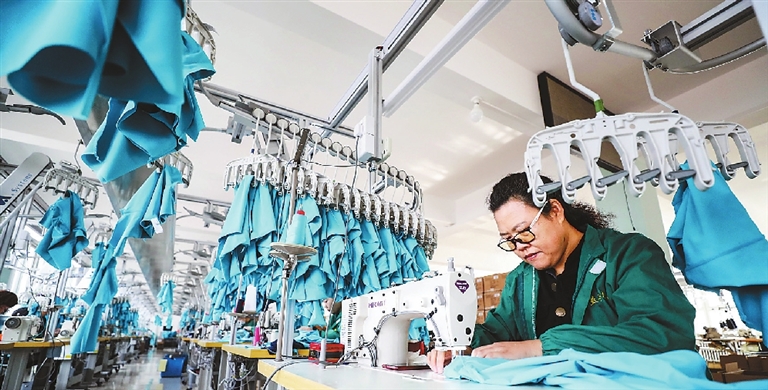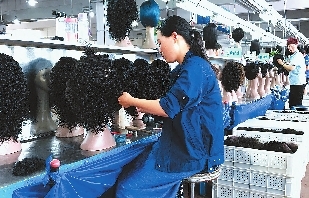

WHEN you lie on the beach, soaking up the sunshine and relishing in a warm breeze, there is at least a 25 percent chance that your swimsuit was made in Huludao, an obscure city shaped like a gourd in Northeast China’s Liaoning Province. In the production workshops of Yifeng Group, a local private swimsuit maker, pieces of blue fabric are hung on the production line, waiting to undergo a 20-plus-step process including cutting and sewing before being packaged and shipped to Britain. “It is a peak production season. Our factory is running at full capacity,” said 61-year-old Liu Xueyan, the chairwoman of the company. There are more than 1,200 swimsuit-making companies like Yifeng in Huludao, whose combined annual output exceeds 14 billion yuan (US$2 billion). The city produced 190 million swimsuits last year, accounting for 25 percent of the global market and 40 percent of the domestic market, local swimsuit industry experts estimated. Making a splash The swimwear industry in Huludao took off in the early 1980s, thanks to the country’s reform and opening up. Every summer, tourists wearing various swimsuits swarmed to the city’s seaside for vacation. Local people sensed the business opportunities. “Many villagers have experience in garment processing, so it was not difficult to make swimsuits with simple designs,” said Yu Shuqin, vice president of the Swimwear Industry Association in Xingcheng, a production hub of swimsuits and a county-level city administered by Huludao. Liu is one of the earliest pioneers of the local industry. When she worked as a civil servant in the local forestry bureau, she made swimsuits at night to earn extra money — six yuan a night, three times that of a civil servant’s daily wage. She quit her stable job and started her own business in 1993. “My husband and I promoted our swimsuits in cities like Beijing, Shenyang and Dalian. They were quickly sold out by beach peddlers at first,” Liu recalled. Later, they moved up the ladder by selling their products in big shopping malls. Over the years, the number of workers in Liu’s factory has increased from dozens to more than 500, and 20-plus sewing machines have been replaced by an advanced production line, with an annual capacity of over 10 million swimsuits. “Family workshops once dominated swimsuit-making in Huludao. Compared with the city’s traditional strengths in petroleum, nonferrous metals and shipbuilding, they were looked down upon by many people,” said Shi Wenguang, a former vice mayor of Huludao who played an important role in developing the local swimsuit industry. The swimwear business stood out as the local government was keen to adjust the city’s industrial structure and reduce its heavy reliance on traditional industries. To create a solid brand image, Huludao has hosted an international beach swimwear culture expo every year since 2011. “Through the expo, we hope to attract more talent and turn their fancy designs into products. Anyway, the final competition in the swimwear industry depends on designers’ creativity and brand connotations,” Shi said. To diversify market channels, the city has seized new opportunities such as e-commerce. The highlight of Peng Wei’s day is to check the sales of his swimsuits on Amazon.com. “Not bad, 10 types of our products were listed on the top-100 best-selling swimsuits last month on Amazon,” said 37-year-old Peng, general manager of Geman Swimwear Co. in Xingcheng. Now Huludao is home to over 35,000 swimsuit e-commerce enterprises. Through global retail platforms such as AliExpress and Amazon, made-in-Huludao swimsuits have been exported to over 140 countries and regions including the United States, Germany and Australia. Up for grabs Indeed, a growing number of small cities and towns in China are well-positioned to benefit from characteristic industries ranging from bikinis to guitars, eyeglasses and wigs. Residents of Zheng’an, a county deep in a valley of Southwest China’s Guizhou Province, used to make their living through farming or becoming a migrant worker. Now they have found a new way out — making guitars. Zheng’an is now home to some 54 guitar-related enterprises. Six out of 10 global guitar brands have manufacturing plants in a local industrial zone. Around 60 percent of products there are exported to more than 30 countries and regions. In Danyang, East China’s Jiangsu Province, rows of glasses shops remind visitors that they are in the beating heart of the world’s production hub for spectacles. There are more than 1,600 companies and around 50,000 people engaged in the eyewear industry. Most of the Chinese wig producers can be traced to Xuchang, a city in Central China’s Henan Province known as a wig-making hub where locals have collected hair for the industry since the Qing Dynasty (1644-1911). Wig companies in Xuchang account for up to half of China’s hair product exports. The total output value of the city’s hair products hit 23.6 billion yuan in 2018 alone, according to the local commerce bureau. Wig-making has also been a business for centuries in Xuchang’s Quandian village after German merchants discovered how the hair of residents there was “straight with a healthy sheen,” according to Zhang Tianyou, vice-president of major wigmaker Henan Rebecca Hair Products. Henan Rebecca Hair Products, after nearly three decades in the business, now supplies stores in more than 40 countries and regions in North America, Europe, Asia and Africa. The company had set up about 20 directly operated stores in the United States for high-end consumers before the United States began imposing additional tariffs on imports from China, but it does not expect to be significantly hit by the trade friction, Zhang said. “Even if we are faced with increasing challenges, we believe in the opportunities offered by the market,” he said. The company opened a wholly owned factory in Nigeria in 2003, becoming the first Chinese wig producer in Africa, according to Zhang. “Since the reform and opening up, a growing number of Chinese workers, farmers and craftsmen have started their own businesses, overcoming difficulties including fund shortages and successfully turning small workshops into big private companies,” said Zhang Wanqiang, an economist with the Liaoning Provincial Academy of Social Sciences. Zhang consideres the industrial cluster an important part of enhancing China’s micro-economic competitiveness and the growth of the private sector, which contributes more than 60 percent of GDP and 80 percent of urban employment. With unique pillar industries, small Chinese cities and towns aim to go further. They are seeking industrial upgrading and exploring new ways to gain high-quality growth. Hair products from Xuchang are also top-selling items on e-commerce giant Alibaba’s shopping portal, maintaining a growth rate of more than 400 percent in the wig trade alone for two consecutive years and ranking third among the most traded commodities, said Li Xiaomin, chief of the foreign trade administration section of Xuchang’s commerce bureau. Facing the increasingly fierce competition and the urgent need for self-development, Huludao is also undergoing transformation. “We use big data to analyze consumer preferences, innovate business models and extend the industry chain to beat the competition and become a leader in the industry,” said Wang Na, chairwoman of Xingcheng Yinghua Swimming Clothing Co. (Xinhua) | 
